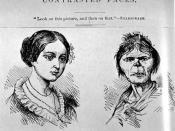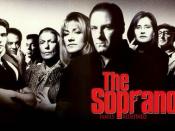Growing up in a teenager's shoes these days is no easy task. Compared to previous generations, this decade has been horrible, full of physical, mental and drug abuse. Another lethal factor is peer pressure, playing a huge role in teenage angst. The problem with all of the negativity going on in our age group, all of the positive thing teens do go un-noticed. Why is it that only the negatives seem to get picked out by society, portrayed in the media and so forth? All that's happening is were beginning to be thought of in brutal stereotypes, viewed in these stereotypes, and beginning to view ourselves in these stereotypes. So while our reputation with the rest of society goes slowly down the drain, I fell the media should smarten up and show the brighter side of teenage life.
Mainly the media shows teens as a lazy group of pot-headed delinquents who have no inhibitions in life.
Television has taken a few stereotypes and transformed the teenage image into a twisted state. The problem with this is that all of the medias information is based on strong generalizations. Thing like piercings, tattoos and hairstyles are thought of as "a generation crying out for attention"ÃÂ in today's media crazed world. Teens think of it as a new trend, as something cool to do. Originality in other generations such as the 70's disco look, the 80's punk rock look and so forth seem normal, but as soon as a kid in this day and age pierces his/her tongue it's a national incident. Many of these factors aren't a cry for attention as many adults may think, but more of a changing of the times. My main point is that many teens use these things as objects of expression, whereas the media turns them around to represent teens as a hideous freak show that should be condemned from society.
Generalizations, which have been stated, seem to dig a deep whole in people's minds. When the media shows people teenagers doing bad things like selling drugs, getting into fights"æ etc. it blows me away that people can't get the idea that just because "some"àteens do bad things, not all teens do them. It would be like teenagers viewing adults as rapists and killers because some adults take the "wayward path"ÃÂ. Is it fair that our generation is shunned because of generalizations? Since when was personal character based on appearance and the views of society? And why is this oppression coming out so clearly in today's world? I admit that I personally know a few people that have made some choices that have resulted in harsh legal penalties. Just because there are a few teenagers like that does not mean that we are all alike in that aspect.
The media also portrays teens as spending their time doing nothing. They put us in shows and in commercials, just sitting around in our "freak show getups"ÃÂ. They send the message across that we are basically just trouble waiting to happen, which is not the case. About 80% of the teens I know responsibly arrange and map out their plans. Very few of them sit around with no job waiting to get into trouble. Another part of this misinterpretation is the attitude of teenagers in general. The media portrays general teenage attitude as "hating everyone and showing no respect"ÃÂ, which in turn goes hand in hand with crime.
Things that are unfair or wrong can be passed up and ignored at small levels, but when they reach a point like the media portrayal of us, it gets to be annoying and saddening. I hardly ever watch TV and I think that is one of the factors that leads to me not really having an angry reaction to hearing about our judgment. But if I did watch a greater amount of TV I think that I would be sickened and want to do something about it. When a society misinterprets it's own future political leaders, economists, and doctors, there is a serious problem. What is more important to some people? Should the media really be making money by attacking its future audience? I know my thoughts sound negative, but what can one person do about this? Even if a whole group of teenagers voiced their opinions, the TV stations and owners would still portray us as they have been. They know that people will still watch. Which goes to show the power that TV and the media have over society. We as teenagers have to realize that the only way to change the thoughts that people have about us is to prove the media wrong and show everyone that we are not the same as we are interpreted.





